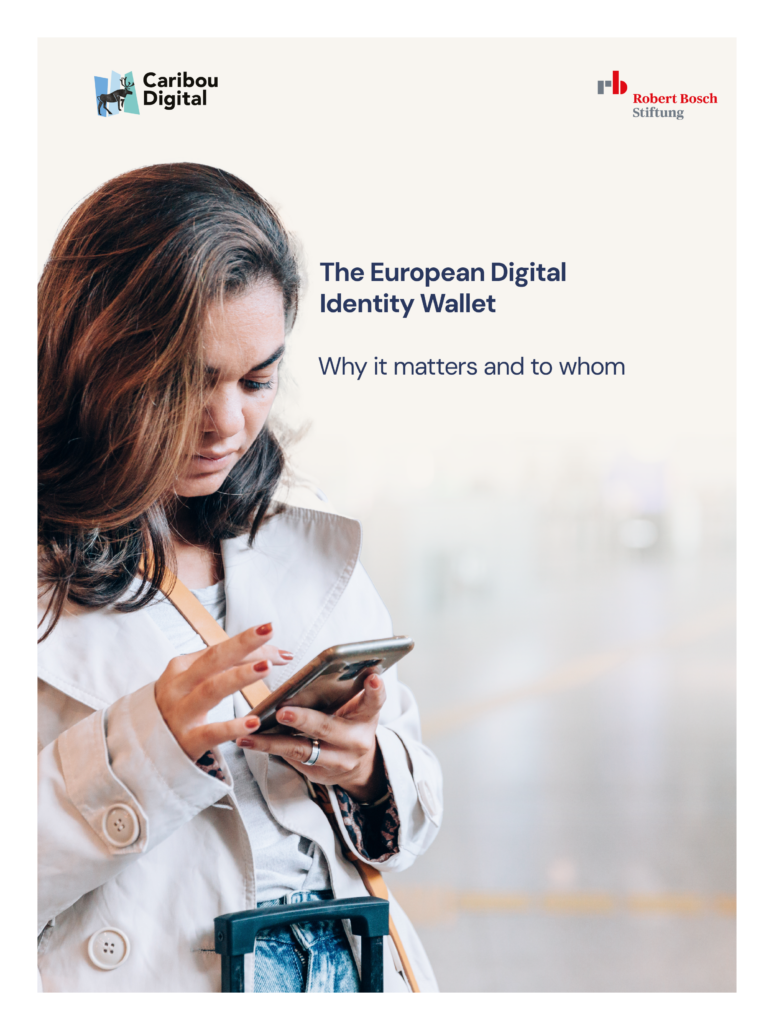Is identity innovation inclusive? Making digital wallets work for people on the move and wider society
A project funded by The Robert Bosch Foundation
A research project to inform policy and technology design. As governments around the world step up to regulate artificial intelligence and biometrics, a different class of technology aims to disrupt digital identity: digital wallets. This project aims to advance migrants’ identification needs in digital identity wallet policy and technology design.
Digital wallets are electronic methods of storing, managing, and exchanging money and/or identity credentials, often through the use of mobile phones. In 2021, the European Commission set out plans to make a digital identity wallet available to all European citizens by 2024. Humanitarian organizations are also turning to decentralized wallets, partly as an alternative to increasingly controversial centralized biometric systems. Aid organizations like the International Federation for the Red Cross and the World Food Programme have piloted digital wallets projects in countries like Kenya, Jordan, and Bangladesh. Influential open-source consortiums like MOSIP (the Modular Open Source Identity Platform) and the Open Wallet Foundation (a project of the Linux Foundation) are also now rolling out wallet-based identity systems for wider use.
Proponents of digital wallets often argue that they give users more control over their data, including in cross-border contexts. They also claim that digital wallets could help correct historic power imbalances between vulnerable people and powerful authorities – but will they? Our project explores the identification needs of migrants in order to support efforts to make digital wallets and other emerging identity innovations work for forced and voluntary, irregular, and regular migrants. It asks:
- Can digital wallets support the needs of migrants (forced and voluntary) across their journeys and through the various identification ‘touchpoints’ they encounter?
- What considerations should inform the design of digital identity wallets and other identity innovations to best meet the needs of forced and voluntary migrants as well as other vulnerable populations?
- Many wallets aimed at refugees offer ‘functional identities’, but not ‘foundational’ ones – are the needs of displaced populations adequately served by these functional identities?
- Migrants, particularly if irregular, sometimes seek to hide their identities. Can tools such as digital wallets adequately address this need/desire for invisibility?
- Why are many state-led and private sector digital identity systems unable to accommodate migrants and non-citizens?
- How can the experiences of migrants help us make identity innovations, like digital wallets, more inclusive for everyone, including marginalized citizens?
Our team
This project is hosted at Caribou Digital and led by a research collective that consists of Project Lead Emrys Schoemaker (PhD LSE, Senior Research Director at Caribou Digital) and Co-Project Leads Aaron Martin (Assistant Professor of Media Studies and Data Science, University of Virginia) and Keren Weitzberg (Senior Lecturer and IHSS Fellow at the School of Politics and International Relations, Queen Mary University of London).
If you are interested in engaging with the project, please contact us at: emrys@cariboudigital.net

Latest Report:
The European Digital Identity Wallet: Why it matters and to whom
The European Digital Identity Wallet (EUDI Wallet) is an ambitious new digital identification infrastructure proposed by the European Commission. The main aim of the EUDI Wallet is to provide European citizens, residents, and businesses with a means to access public and private services across the EU, making it easier for them to identify, verify, and authenticate themselves in member states other than their own.
Our latest report provides an accessible overview of the EUDI Wallet and interrogates why this matters and to whom.
Read the report and access the policy recommendations:
Latest Blog:
Digital Identification in Africa — notes from ID4Africa
Digital identification is one of the central elements of digital transformation, and governments, civil society and development actors are paying increasing attention to it.
Read insights from this key industry event:



